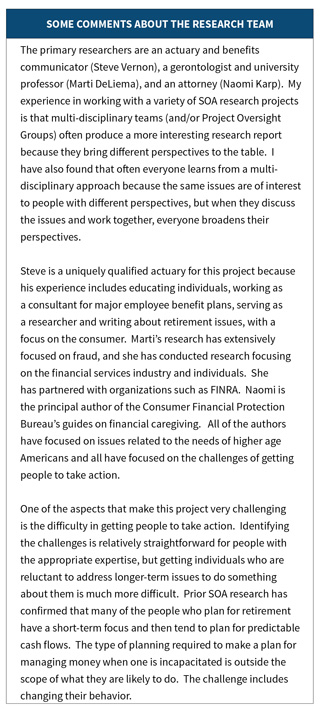Supporting Older Americans: Research on Thinking Ahead—Keeping Your Money Safe as You Age
By Anna M. Rappaport
Retirement Section News, March 2022

The Society of Actuaries (SOA) Aging and Retirement research program is focused on understanding issues related to the post-retirement period, to aging in general and to providing resources to help older individuals. One of the Aging and Retirement program’s recent major projects was focused on understanding how people could keep their money safe as they aged, and what action steps would be helpful in implementing a program. This project is very important because as people age into their later years, they may experience diminished decision-making capacity. The diminished capability could make them vulnerable to financial losses due to making mistakes, exploitation by unethical acquaintances, family members or friends, or fraud.
The research report “Thinking Ahead Roadmap: Informing the Design of a Roadmap for Keeping Your Money Safe As You Age” can be found at https://www.soa.org/resources/research-reports/2020/thinking-ahead/. The SOA sponsored the research and the AARP sponsored the development of a guide and consumer resources using the research (both can be found at https://thinkingaheadroadmap.org).
The research project included interviews with experts, interviews with individuals, and focus groups with an emphasis on testing messages of interest. One of the focus groups consisted of Black/African Americans and one consisted of Hispanics/Latinos. Others focused on lower income individuals.
The tools that were created as a result of this research focus on a combination of: 1) actions that simplify the process of developing and implementing a plan, and 2) the engagement of someone to help with the management of money as one ages. They include tools to help identify and choose a helper or financial advocate, sample messages to help start and conduct the engagement with the person who will be helping, a roadmap for organizing financial information for the helper, and some basic information about legal requirements and resources.
The research found that some messages were turn-offs to older individuals and some were potentially a turn-off to the people who would help them, while other messages had a much better chance of success.
The focus groups revealed that participants had focused on what would happen after they died but not the possibility that they might need help while they were still alive. The issues discussed seemed to be a wake-up call to some of the participants.
The research was presented at the 2021 ImpACT Conference. The SOA selected the session for an Outstanding Session Award.
Congratulations goes to the research team for this extremely valuable set of research.
The authors of the report are Marguerite DeLiema, Ph.D., University of Minnesota, Twin Cities; Steven Vernon, FSA, Rest-of-Life Communications; Naomi Karp, JD, consultant on aging, law and policy; Mingyang Zheng, MSW, University of Minnesota, Twin Cities.
I have asked each of the authors to answer a few questions and added my comments to their responses.
Anna Rappaport (AR): Why were you interested in this project?
Naomi Karp (NK): As an elder law attorney who works on policy, research, education, and advocacy, I have seen the importance of advance planning for incapacity for many years. There has been a lot of focus on advance care planning for health care decision-making, but not much focus on the financial side, which is equally important. So, I really wanted to work on a tool for people as they age to help them understand that planning ahead allows them to remain in control and maximizes their later-life economic security. I've seen the consequences of failing to plan, ranging from money mistakes to financial exploitation to the imposition of guardianship which totally strips people of control over their lives and finances.
Steve Vernon (SV): I have both a personal and professional interest in helping older people manage their money as they age. Personally, my siblings and I saw our parents’ vulnerability as they aged into their late 80s and early 90s, and we stepped in to help. We flew by the seat of our pants, and now I wish we had the Thinking Ahead Roadmap to guide us. Professionally, I see the statistics on the prevalence of cognitive decline and resulting financial losses. I want to help seniors and their families from incurring devastating financial losses and experiencing the grief and disruption that can follow.
Marti DeLiema (MD): My scholarship focuses on fraud and elder financial abuse. There's very little that professionals, family members, and individuals can do after fraud or abuse has occurred. I was inspired to do this project because advance care planning is a smart early prevention strategy that can keep a person's finances safe from exploitation in the future.
AR: All of our researchers saw a need for more help for people. This is not surprising to me. Some of the SOA’s Aging and Retirement research focused on shocks and unexpected events. One of the answers heard in focus groups was “We will deal with it when it happens.” Unfortunately, too many people feel that way. In our work on cognitive decline, we heard some nightmare stories. In the case of cognitive decline, if one waits until it happens, it can be too late, and the results can be very bad.
This work is extremely important because it helps us identify and fill in gaps in traditional planning. It is also extremely important because the research was followed up with action steps and tools.
AR: What surprised you about the results of the research?
MD: I was surprised by the many reasons people share for why they haven't had open conversations about their money and their future goals with friends or family. Some people were embarrassed about their finances, others felt like there was no one they could trust, and others didn't want to accept any help, thinking that they would be a burden. We found that there is a solution to overcome each of these reasons, and that people feel much better after they've completed their plan and discussed it with the people they trust.
SV: The research showed how different everybody is with respect to their financial resources, family situations, beliefs, biases, and capabilities. There’s not a “one-size-fits-all” solution.
NK: I was surprised at the range of factors and messages that motivate people to want to do advance financial planning. Some want to find peace of mind, some want to protect themselves from fraud, some don't want to burden their children—all good reasons, but different things resonate for different people. Also, I was interested that we ran across a large number of individuals and professionals who are concerned about "aging solo" and the shortage of options for identifying a financial advocate when someone lacks a partner or an adult child who can play that role. Our society needs to come up with more free or low-cost services for people without natural surrogates to step in.
AR: I was not surprised by the results. The SOA’s prior work on the family and retirement security indicated that there was little involvement of the family in retirement planning, but a lot of involvement when help was needed later on. More planning would have served both generations better. The prior work also indicated that the most common types of help were “physical” (things like driving people places, assisting with shopping and assisting with household tasks), rather than helping with money management. The SOA’s prior research had also identified a significant number of situations where traditional family help was much less likely, like solo agers and blended families.
AR: Is there something that you found that people commonly forget?
MD: People think that if they have a will then they are all set. They don't realize that it's also important to designate someone to make decisions for them while they are living, because most people experience some period of incapacity as they age.
SV: Well, people commonly forget to do anything about protecting themselves as they age, so any steps they take are steps in the right direction.
NK: People forget that if you don't take affirmative action towards a safe and secure future, things won't just work out on their own. People are avoiders and procrastinators, but they shouldn't be when it comes to planning for future financial decision-making.
AR: This is all part of a failure to think longer term, and a failure to think about risks ahead of time.
How You can Help
These resources are for the public and they are also suitable for plan sponsors to use with employees, financial services companies to use with audiences, etc. All SOA members are encouraged to tell others about these important resources. There are presentation slides about the research and materials. If you belong to a local group that might be interested, you are encouraged to tell them about the program and maybe do a short presentation. If you need help, a member of the research team or Aging and Retirement committee may be able to help you. If you personally use the tools with a client or in your (or someone else’s) personal life, you can share the information about how they helped you.
Statements of fact and opinions expressed herein are those of the individual authors and are not necessarily those of the Society of Actuaries, the newsletter editors, or the respective authors’ employers.
Anna Rappaport, FSA, serves as chairperson of the Committee on Post-Retirement Needs and Risks. She can be reached at anna.rappaport@gmail.com.
Naomi Karp, JD, is a consultant on aging, law, and policy for educational, governmental and non-profit clients. She is a lawyer and policy expert who has worked on aging issues for over 35 years. She is the co-author of the Thinking Ahead Roadmap, a guide and web-based tool to help people keep their money safe as they age.
Marti DeLiema, Ph.D., University of Minnesota, School of Social Work. Professor DeLiema is an interdisciplinary gerontologist, driven to understanding how our society can cultivate long, healthy, and fulfilling lives for all citizens. She collaborates with financial institutions, the Federal Trade Commission, the US Postal Inspection Service, the FINRA Foundation, and other agencies to analyze victimization risk factors and test efforts to inoculate consumers from fraud.
Steve Vernon, FSA, is president of Rest-of-Life Communications, where he is active with research, writing, and speaking on the most critical issues facing older workers and retirees. Steve has published seven books on retirement planning, and he has written over 1,000 columns on retirement strategies for CBS MoneyWatch and Forbes.com. His latest book focuses on retirement income strategies—Don’t Go Broke in Retirement: A Simple Plan to Build Lifetime Retirement Income. For more information, www.restoflife.com or steve.vernon@restoflife.com.

